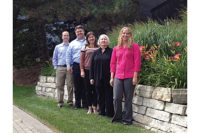It is incredibly rewarding to see what the foundation has been able to produce over the years.
When the ASA Education Foundation Board of Trustees met this past April, it was announced that the ASA Education Foundation has invested $5.5 million into the PHCP and PVF industry since 2000.
“To quantify the foundation’s work by putting a dollar figure on what has been reinvested back into our industry places a new face on the ASA Education Foundation,” states Joe Maiale of InSinkErator and president of the ASAEF Board of Trustees. “ASA members are well-informed about the programs available from the foundation through ASA University. We have made it a policy to familiarize our membership with the foundation’s development and delivery of educational and training programs, educational subsidies and industry technology. Until now, we’ve never stated it in financial terms.”
Amy Black, the ASA Education Foundation Executive Director since 2009, adds: “Our ability to present to the industry the highest level of education and training, plus access to a team of people who can show a company how to implement and maintain it, all at a price point that makes it accessible to companies of any size, is a direct result of the funding available to us. It’s a privilege to take the concept of a self-sustaining foundation and make it a reality. When we looked at just how much has been reinvested in our industry, it was a significant moment for everyone involved. ”
In the years since the ASA Education Foundation established the Karl E. Neupert Endowment Fund, it has advanced to become the singular resource for fundamentally sound and technologically advanced training and education in the PHCP and PVF industry. The educational offerings available are vast in number and cover the wide variety of jobs necessary to run a successful wholesale distributor [see sidebar].
To ensure this type of productivity continues, the Board of Trustees is committed to increasing the financial stability of the endowment.
“We were advised by our investment manager that new contributions must be made to the corpus on an annual basis,” states Nick Giuffre of Bradford White and chairman of the Endowment Investment Committee. “There are many factors that come into keeping an endowment healthy. It’s not just wise spending but also addressing the effects of inflation and the costs of management fees. It is incredibly rewarding to see what the foundation has been able to produce over the years. Our objective is to ensure that another $5.5 million — or more — can be reinvested into this industry we all value.”
The foundation has produced a new brochure on the Karl E. Neupert Endowment Fund that will be distributed to all ASA members. “ASA has grown so much since 2000 that we have a great many new members who don’t know about the endowment fund or the history behind it,” Maiale adds. “It is a disservice to them that we haven’t shared with them this fundamental part of our success and given them the opportunity to be a part of it.”
By welcoming new donations that will be added to the corpus, the ASA Education Foundation will be able to fulfill its plans for the near future and continue its constant investment in the PHCP and PVF industry.
To that end, the ASA Education Foundation is introducing the Master of Distribution Management program from ASA University. This comprehensive approach to education and training focuses on these key competency areas:
- Decision making & strategic decision making;
- Delegating responsibility and follow-up;
- Planning and organizing;
- Communication;
- Building trust and gaining commitment;
- Coaching and developing others;
- Managing conflict; and
- Technical/professional skills and knowledge.
The master’s curriculum is a mix of core and elective courses presented in varied formats for the candidate’s optimal retention. After all requirements are completed, master’s program students must complete a final assessment to qualify for the Capstone Project and earn their master’s honor.
“The objective behind the creation of the Master of Distribution Management program is to develop the industry’s top talent,” says George Yezbak of Murray Supply and chairman of the MDM Task Group. “It was designed to be a truly immersive educational experience with candidates completing a mixture of core and elective courses. These are followed by a final assessment and a case-study project that illustrates how they successfully implemented a strategy or approach within their company which demonstrates their aptitude and understanding about how a distribution manager successfully performs on the job. This will be presented to a peer review board, just as a thesis must be defended in a traditional master’s program.”
The recommended prerequisites for participation include the MDM candidate has a minimum of four years of wholesale distribution experience with at least one year in a management role prior to enrolling in the MDM program.
Enrollment in this program begins in July. “There always is a thrill that comes with bringing a new program to market,” Yezbak adds. “This one is causing exceptional buzz among the trustees and around the industry. We are looking forward to seeing the positive impact this advanced level of training will have on our members’ business success.”
For more information on the Karl E. Neupert Endowment Fund, the Master of Distribution Management program or any of the foundation’s activities, please contact Amy Black at ablack@asa.net or 630/ 467.0000, ext. 202.





